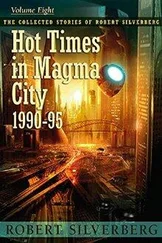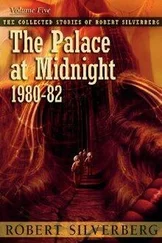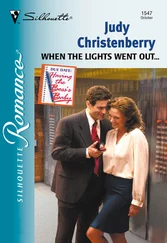Robert Silverberg - How it Was When the Past Went Away
Здесь есть возможность читать онлайн «Robert Silverberg - How it Was When the Past Went Away» весь текст электронной книги совершенно бесплатно (целиком полную версию без сокращений). В некоторых случаях можно слушать аудио, скачать через торрент в формате fb2 и присутствует краткое содержание. Год выпуска: 2007, ISBN: 2007, Издательство: Subterranean Press, Жанр: Фантастика и фэнтези, на английском языке. Описание произведения, (предисловие) а так же отзывы посетителей доступны на портале библиотеки ЛибКат.
- Название:How it Was When the Past Went Away
- Автор:
- Издательство:Subterranean Press
- Жанр:
- Год:2007
- ISBN:978-1-59606-089-0
- Рейтинг книги:4 / 5. Голосов: 1
-
Избранное:Добавить в избранное
- Отзывы:
-
Ваша оценка:
- 80
- 1
- 2
- 3
- 4
- 5
How it Was When the Past Went Away: краткое содержание, описание и аннотация
Предлагаем к чтению аннотацию, описание, краткое содержание или предисловие (зависит от того, что написал сам автор книги «How it Was When the Past Went Away»). Если вы не нашли необходимую информацию о книге — напишите в комментариях, мы постараемся отыскать её.
How it Was When the Past Went Away — читать онлайн бесплатно полную книгу (весь текст) целиком
Ниже представлен текст книги, разбитый по страницам. Система сохранения места последней прочитанной страницы, позволяет с удобством читать онлайн бесплатно книгу «How it Was When the Past Went Away», без необходимости каждый раз заново искать на чём Вы остановились. Поставьте закладку, и сможете в любой момент перейти на страницу, на которой закончили чтение.
Интервал:
Закладка:
Carole insisted on spending Thursday night with him.
“We aren’t man and wife any more,” he had to tell her. “You divorced me.”
“Since when are you so conventional? We lived together before we were married, and now we can live together after we were married. Maybe we’re inventing a new sin, Paul. Postmarital sex.”
“That isn’t the point. The point is that you came to hate me because of my financial mess, and you left me. If you try to come back to me now, you’ll be going against your own rational and deliberate decision of last January.”
“For me last January is still four months away,” she said. “I don’t hate you. I love you. I always have and always will. I can’t imagine how I would ever have come to divorce you, but in any case I don’t remember divorcing you, and you don’t remember being divorced by me, and so why can’t we just keep going from the point where our memories leave off?”
“Among other things, because you happen to be Pete Castine’s wife now.”
“That sounds completely unreal to me. Something you dreamed.”
“Freddy Munson told me, though. It’s true.”
“If I went back to Pete now,” Carole said, “I’d feel sinful. Simply because I supposedly married him, you want me to jump into bed with him? I don’t want him. I want you. Can’t I stay here?”
“If Pete—”
“If Pete, if Pete, if Pete! In my mind I’m Mrs. Paul Mueller, and in your mind I am too, and to hell with whatever Freddy Munson told you, and everything else. This is a silly argument, Paul. Let’s quit it. If you want me to get out, tell me so right now in that many words. Otherwise let me stay.”
He couldn’t tell her to get out.
He had only the one small cot, but they managed to share it. It was uncomfortable, but in an amusing way. He felt twenty years old again for a while. In the morning they took a long shower together, and then Carole went out to buy some things for breakfast, since his service had been cut off and he couldn’t punch for food. A dunning robot outside the door told him, as Carole was leaving, “The decree of personal service due has been requested, Mr. Mueller, and is now pending a court hearing.”
“I know you not,” Mueller said. “Begone!”
Today, he told himself, he would hunt up Freddy Munson somehow and get that cash from him, and buy the tools he needed, and start working again. Let the world outside go crazy; so long as he was working, all was well. If he couldn’t find Freddy, maybe he could swing the purchase on Carole’s credit. She was legally divorced from him and none of his credit taint would stain her; as Mrs. Peter Castine she should surely be able to get hold of a couple of bigs to pay Metchnikoff. Possibly the banks were closed on account of the memory crisis today, Mueller considered; but Metchnikoff surely wouldn’t demand cash from Carole. He closed his eyes and imagined how good it would feel to be making things once more.
Carole was gone an hour. When she came back, carrying groceries, Peter Castine was with her.
“He followed me,” Carole explained. “He wouldn’t let me alone.”
He was a slim, poised, controlled man, quite athletic, several years older than Mueller—perhaps into his fifties already—but seemingly very young. Calmly he said, “I was sure that Carole had come here. It’s perfectly understandable, Paul. She was here all night, I hope?”
“Does it matter?” Mueller asked.
“To some extent. I’d rather have had her spending the night with her former husband than with some third party entirely.”
“She was here all night, yes,” Mueller said wearily.
“I’d like her to come home with me now. She is my wife, after all.”
“She has no recollection of that. Neither do I.”
“I’m aware of that.” Castine nodded amiably. “In my own case, I’ve forgotten everything that happened to me before the age of twenty-two. I couldn’t tell you my father’s first name. However, as a matter of objective reality, Carole’s my wife, and her parting from you was rather bitter, and I feel she shouldn’t stay here any longer.”
“Why are you telling all this to me?” Mueller asked. “If you want your wife to go home with you, ask her to go home with you.”
“So I did. She says she won’t leave unless you direct her to go.”
“That’s right,” Carole said. “I know whose wife I think I am. If Paul throws me out I’ll go with you. Not otherwise.”
Mueller shrugged. “I’d be a fool to throw her out, Pete. I need her and I want her, and whatever breakup she and I had isn’t real to us. I know it’s tough on you, but I can’t help that. I imagine you’ll have no trouble getting an annulment once the courts work out some law to cover cases like this.”
Castine was silent for a long moment.
At length he said, “How has your work been going, Paul?”
“I gather that I haven’t turned out a thing all year.”
“That’s correct.”
“I’m planning to start again. You might say that Carole has inspired me.”
“Splendid,” said Castine without intonation of any kind. “I trust this little mixup over our—ah—shared wife won’t interfere with the harmonious artist-dealer relationship we used to enjoy?”
“Not at all,” Mueller said. “You’ll still get my whole output. Why the hell should I resent anything you did? Carole was a free agent when you married her. There’s only one little trouble.”
“Yes?”
“I’m broke. I have no tools, and I can’t work without tools, and I have no way of buying tools.”
“How much do you need?”
“Two and a half bigs.”
Castine said, “Where’s your data pickup? I’ll make a credit transfer.”
“The phone company disconnected it a long time ago.”
“Let me give you a check, then. Say, three thousand even? An advance against future sales.” Castine fumbled for a while before locating a blank check. “First one of these I’ve written in five years, maybe. Odd how you get accustomed to spending by telephone. Here you are, and good luck. To both of you.” He made a courtly, bitter bow. “I hope you’ll be happy together. And call me up when you’ve finished a few pieces, Paul. I’ll send the van. I suppose you’ll have a phone again by then.” He went out.
“There’s a blessing in being able to forget,” Nate Haldersen said. “The redemption of oblivion, I call it. What’s happened to San Francisco this week isn’t necessarily a disaster. For some of us, it’s the finest thing in the world.”
They were listening to him—at least fifty people, clustering near his feet. He stood on the stage of the bandstand in the park, just across from the De Young Museum. Shadows were gathering. Friday, the second full day of the memory crisis, was ending. Haldersen had slept in the park last night, and he planned to sleep there again tonight; he realized after his escape from the hospital that his apartment had been shut down long ago and his possessions were in storage. It did not matter. He would live off the land and forage for food. The flame of prophecy was aglow in him.
“Let me tell you how it was with me,” he cried. “Three days ago I was in a hospital for mental illness. Some of you are smiling, perhaps, telling me I ought to be back there now, but no! You don’t understand. I was incapable of facing the world. Wherever I went, I saw happy families, parents and children, and it made me sick with envy and hatred, so that I couldn’t function in society. Why? Why? Because my own wife and children were killed in an air disaster in 1991, that’s why, and I missed the plane because I was committing sin that day, and for my sin they died, and I lived thereafter in unending torment! But now all that is flushed from my mind. I have sinned, and I have suffered, and now I am redeemed through merciful oblivion!”
Читать дальшеИнтервал:
Закладка:
Похожие книги на «How it Was When the Past Went Away»
Представляем Вашему вниманию похожие книги на «How it Was When the Past Went Away» списком для выбора. Мы отобрали схожую по названию и смыслу литературу в надежде предоставить читателям больше вариантов отыскать новые, интересные, ещё непрочитанные произведения.
Обсуждение, отзывы о книге «How it Was When the Past Went Away» и просто собственные мнения читателей. Оставьте ваши комментарии, напишите, что Вы думаете о произведении, его смысле или главных героях. Укажите что конкретно понравилось, а что нет, и почему Вы так считаете.












